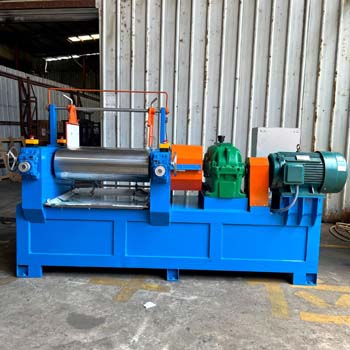Open mixing mills are also known as laboratory two roll mill ,it is foundational machines used for blending, sheeting, and mastication of materials, these open mixing mills are widely used in the rubber and plastic industries to mix and refine materials.
As when the rubber mixing mill is working ,its temperature are generate Temperature plays a important role in the mixing process of rubber and plastic compounds . Too much heat can lead to premature curing (scorching), while insufficient heat may result in poor dispersion and low-quality sheets.
Thus ,in order to achieve consistent and high-quality results, controlling temperature during the mixing process is curcial for the open mixing mill equipment.
Before ,people are upset by the uncertain high temperature and now ,there is a mold temperature controller (MTC) come out to solve this problem. A mold temperature controller is crucial to assure this thermal regulation, which ensure the mold maintains a precise temperature to optimize cycle time, reduce defects.
For manufacturers who want to improve consistency and scale up their operations, pairing their open mill with a mold temperature controller is a smart investment.
What is a Mold Temperature Controller?
A mold temperature controller is a device that regulates the temperature of heating or cooling media (typically water or oil), which circulates through the rollers or other parts of the mill. It maintains a precise and stable temperature, often within ±1°C of the target setpoint, even during continuous operation.
Benefits of Using MTC with an Open Mixing Mill
1. Improved Material Quality
Mold Temperature Controller (MTC ) prevent temperature fluctuations that can lead to uneven mixing. With stable heat control, the dispersion of fillers, pigments, and other additives is significantly improved, resulting in consistent batch quality.
2. Shorter Mixing Time
By maintaining optimal processing temperature at the begining of process, Mold Temperature Controller (MTC ) help reduce the time needed for better mastication and mixing. This leads to faster cycle times and increased production efficiency.
3. Enhanced Safety
Since overheating is a safety risk in rubber processing ,thus mold temperature controller (MTC) can decrease too hot , which therefore reduce the risk of compound degradation, scorching, or operator injury.
4. Energy Savings
The Mold Temperature Controller (MTC ) delivers only the amount of energy required to maintain the target temperature but instead of running the rollers at maximum heating capacity all the time. Thus ,it would reduce energy consumption and operating costs.
5. Longer Equipment Life
As the constant heating and cooling cycles can shorten the lifespan of mill components. A mold temperature controller ensures gradual and controlled temperature changes, extending the longevity of your equipment.







